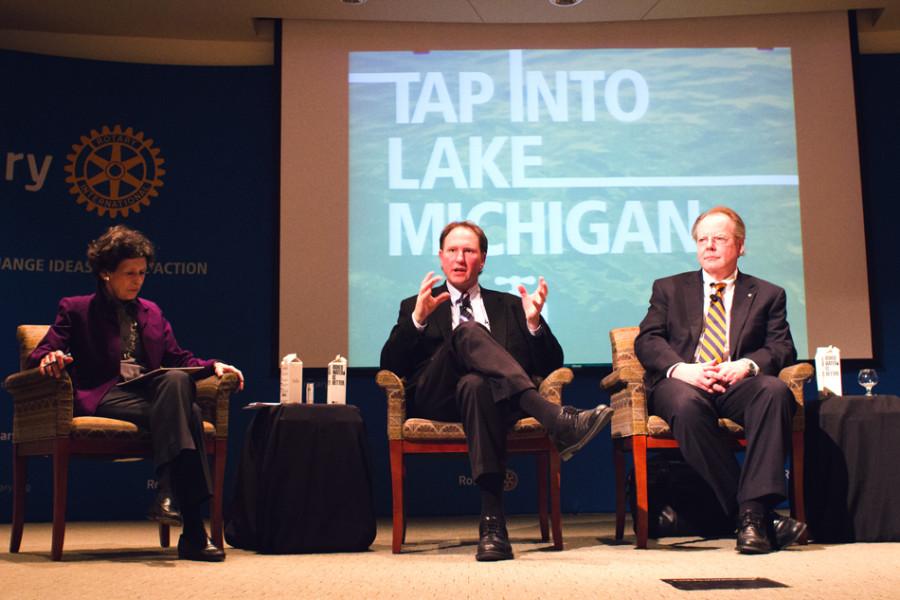Experts discuss solutions to global water crisis on local scale
Connie Wang/The Daily Northwestern
A panel of experts answer questions about local water conservation. Rotary International hosted an event Tuesday to discuss diverse ways to improve and conserve Great Lakes water.
March 31, 2015
A panel of water experts Tuesday discussed ways to better use Great Lakes water, from cleaning up toxic hotspots to using conservation techniques in beer production.
Around 100 people attended the Rotary International event, called “Tap Into Lake Michigan,” which centered on localizing the global water crisis to the Midwest. The four panelists stressed the importance of conserving and improving Great Lakes water, which provides 95 percent of the country’s fresh surface water.
“We have to stop assuming we can throw anything at them and they’ll be just fine because they’re that big,” said panelist Cameron Davis, senior adviser to the administrator at the U.S. Environmental Protection Agency. “How we treat the Great Lakes truly is a reflection of how we treat ourselves.”
Davis said despite the “150 years of abuse” inflicted on the Great Lakes, the federal government has begun to overcome challenges, such as pollution and invasive species, with the help of the Great Lakes Restoration Initiative passed five years ago. The bill has helped fund efforts to revive wetlands, prevent the proliferation of invasive species and clean up highly polluted areas, Davis said.
Beer was served at a reception prior to the panel discussion — a unique but effective move to stress the water’s key role in the brewing process, said panelist Ian Hughes, assistant brewery manager at Goose Island Beer Co. His beer company, founded and currently headquartered in Chicago, provided beer, along with other local breweries, to garner interest in the water crisis.
“Beer is over 90 percent water in the finished product,” Hughes said. “We’re quite literally putting Lake Michigan into our beer every time we make it.”
Because of its reliance on water, Goose Island has tried to conserve water in the brewing process, such as sanitizing barrels with steam and organizing community efforts, like an annual beach cleanup.
Rotary International chose panelists to represent a range of sectors, including private, public, academic and civil society, said Erica Gwynn, area focus manager for water and sanitation at the organization. She said it was important to include a civil society panelist like Andy Stuart from Rotary in Toledo, Ohio, to remind the audience that the water crisis is not removed from the average community member.
Rotary International, which hosted the event at its global headquarters at 1560 Sherman Ave., devotes $14 million per year to to water and sanitation.
J Poulos, a 25-year-old Chicago resident and audience member, questioned what individuals could do in their daily lives to conserve water.
“There are a lot of people out there who are actually jazzed about this stuff and there’s still time,” Poulos said. “We can make a difference. The resources are still there.”
Individuals have a range of options to help conserve water locally, from buying a low-flow showerhead to replacing their lawn with native plants that do not need extra watering, said panelist Debra Shore, commissioner of the Metropolitan Water Reclamation District of Greater Chicago.
“Our challenge, as people lucky enough to live near the Great Lakes, is we need to bust the notion of infinitude,” Shore said. “The Great Lakes look infinite … and though water is a renewable resource, it’s a finite resource.”
Email: [email protected]
Twitter: @juliarebeccaj


